AA: I'm Avi Arditti with Rosanne Skirble, and this week on WORDMASTER: We check in with the American Dialect Society for some notable words from the past year, including the one that the group considers least likely to succeed.
RS: But we start with the word of the year for 2010 as voted Friday night at a meeting of language scholars in Pittsburgh, Pennsylvania. Ben Zimmer chairs the New Words Committee of the American Dialect Society.
BEN ZIMMER: "The word of the year is 'app,' a-p-p. That's, of course, an application program for a computer or a phone operating system. It's a word that has been around for a while. People might have talked about a 'killer app,' a particularly important computer application, like spreadsheets were a killer app.
"But now we use that word app just to refer to these little programs that we run on our mobile devices or on Facebook or lots of other places. People just expect anything should have some sort of associated app now."
RS: "Was app the overwhelming victor?

BEN ZIMMER: "Well, the word that came in second place was also a three-letter word, and the one that app beat out is 'nom,' n-o-m, which is a form of onomatopoeia. In other words, it sounds like what it's supposed to represent, in this case the sound of pleasurable eating. You can think of it a bit like 'yum.' It can be used an interjection. It can be used as a noun to refer to delicious food. You could talk about 'noms' as in 'Let's get some noms,' meaning let's get some food to eat."
AA: "When did this arrive on the scene?"
BEN ZIMMER: "Well, it's been percolating for the past few years, especially online. It also started showing up this past year a lot on Twitter, where on Twitter sometimes if you're sending a tweet while you're eating, you might append a nom on that to talk about how delicious whatever food you're eating happens to be.
"There's a lot of dispute actually about where exactly it first developed. But Cookie Monster from 'Sesame Street' seems to have played an important role in people's use of this, because Cookie Monster on that children's television show eats cookies in a very ravenous fashion. And the noise that he makes as he's eating cookies sounds like 'nom, nom, nom, nom, nom, nom."
AA: "Now, I'm looking at the category of least likely to succeed, and I see that the winner there, with 44 out of 85 votes cast in that category, was -- how do you even pronounce that?"
RS: "Cultur-OH-mics?"
AA: "I can never say it."
BEN ZIMMER: "Well, that's part of the problem --
RS: "Cultur-AH-mics?"
BEN ZIMMER: "People don't know how to pronounce it. The word is 'culturomics,' and it's pronounced cultur-oh-mics, spelled c-u-l-t-u-r-o-m-i-c-s. It's that o-m-i-c-s ending that confused a lot of people. Some people thought this word should be pronounced cultur-ah-mics because it seems like it might have to do with economics.
"But what this word is, it came from a paper that was published in the journal Science by a team of researchers at Harvard and Google. And it was about research that was done analyzing the history of language and culture by using the millions and millions of books and other materials that have been scanned by Google from the big research libraries.
"What's called Google Books has created a big corpus, or collection of texts, that can now be analyzed in very interesting new ways. And there are all sorts of great new applications, and Google actually presented this to the public in the form of what they called the N-gram Viewer which allows you to plug in words or phrases and see how they've waxed and waned over time. So there's all sort of really interesting applications for this research. Unfortunately the name that was given did not quite resonate with people who were trying to figure out what the heck it might mean.
"The name was a bit of a stumper, and the problem with the name is that -omics ending comes from genomics. So that's the study of the human genome and how you can find out things about evolution or population dynamics by crunching lots of data and doing what's called genomics. And so the idea here is you could crunch lots of data about the history of culture and use those similar research techniques for what they call culturomics."
RS: Ben Zimmer is executive producer of VisualThesaurus.com and the "On Language" columnist for the New York Times Magazine. He heads the New Words Committee of the American Dialect Society.
AA: For links to all of their notable words of 2010 and previous years, and that N-gram Viewer we talked about, go to voanews.com/wordmaster. RS: And that's WORDMASTER for this week. With Rosanne Skirble, I'm Avi Arditti.
onomatopoeia: the fact of words containing sounds similar to the noises they describe, for example hiss or thud; the use of words like this in a piece of writing 象聲;擬聲;擬聲法
corpus: a collection of written or spoken texts (書面或口語的)文集,文獻(xiàn),匯編;語料庫
Internet English 網(wǎng)絡(luò)英語
(來源:VOA 編輯:崔旭燕)
